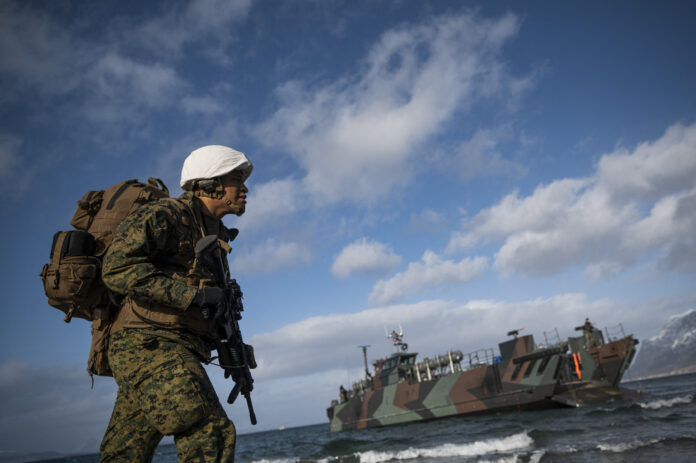NATO has activated its “chemical, biological, radiological and nuclear defence elements” amid fears Russia could launch a biological strike in Ukraine.
Following an emergency summit of the military alliance on Thursday, NATO Secretary-General Jens Stoltenberg told reporters in Brussels the decision comes as the allies move to equip Ukraine with its own biological defences.
“Our top military commander … has activated NATO’s chemical, biological, radiological and nuclear defence elements,” he said.
“And allies are deploying additional chemical and biological and nuclear defences to reinforce our existing and new battlegroups, so we are taking measures both to support Ukraine and also to defend ourselves.”
Stoltenberg made the announcement as part of a slew of new measures taken by the military alliance to boost its presence in eastern Europe amid a growing Russian threat, he said.
NATO is sending four new battlegroups to Bulgaria, Hungary, Romania and Slovakia, Stoltenberg announced, while promising the allies will further support Ukraine in its fight against Russia as the invasion hit the one-month mark Thursday.
However, the West fears Russia, which has yet to make significant ground in Ukraine, could escalate the conflict by using biological weapons. Leaders have expressed their fears over such an attack, but have not provided evidence one is looming.
Their worries stem from Russian misinformation that the United States is assisting Ukraine in creating biological weapons. American officials have blasted Moscow for spreading an unproven claim as a possible prelude to potentially launching its own biological or chemical attacks on Ukraine.
That fear was enough for NATO to up its assistance to Ukraine, Stoltenberg said.
“Allies agreed to supply equipment to help Ukraine protect against chemical, biological, radiological and nuclear threats,” he said.
“This could include detection equipment, protection and medical support, as well as training for decontamination and crisis management.”
Biden cites ‘real threat’ of Russia using chemical weapons in Ukraine
If a chemical strike were to happen in Ukraine, the effects of it could spill into other parts of Europe, Stoltenberg said. That means NATO allies have to be prepared for worst-case scenarios.
Trending Stories
Tom Hanks photobombs wedding party — again — leaving bride in ‘disbelief’
Thousands of Canadian seniors scramble to file taxes following federal error
“Any use of chemical weapons will totally change the nature of the conflict, it will be blatant violation of international law and it will have widespread consequences,” Stoltenberg said.
“It will affect the people in Ukraine, but there is also a risk that it will have a direct effect on people living in NATO countries because we can see contamination, we can see the spread of chemical agents or biological weapons into our countries.”
He did not provide any evidence a biological weapons’ attack was looming, nor did he elaborate on what kind of defences NATO allies would be activating to protect themselves. NATO leaders said in a statement they will “take further decisions when we meet in Madrid” in June.
Earlier in the week, a senior U.S. defence official told Reuters that America has not yet seen any concrete proof of an imminent Russian chemical or biological weapons attack, but is closely monitoring intelligence for them.
President Joe Biden said on Monday, without providing evidence, that Russia’s false accusations that Kyiv has biological and chemical weapons showed Russian President Vladimir Putin was considering using them.
NATO Secretary-General Jens Stoltenberg arrives to give a press conference after the Extraordinary Summit of NATO Heads of State and Government in Brussels, Belgium on March 24.
Halil Sagirkaya/Anadolu Agency via Getty Images
The U.S. official, who spoke to Reuters on condition of anonymity, shared Biden’s assessment but said “there’s no indication that there’s something imminent in that regard right now.”
Ukrainian President Volodymyr Zelenskyy on Thursday called on Canada and its NATO allies to increase military support for Ukraine as it defends against the invading Russian army.
In a pre-recorded video address to NATO’s emergency summit, which Prime Minister Justin Trudeau attended, Zelenskyy warned that Russia poses a threat to NATO nations in eastern Europe.
Zelenskyy asks NATO to provide 1 per cent of its military to Ukraine amid Russian invasion
Russia “wants to go further. Against eastern members of NATO. The Baltic states. Poland for sure,” Zelenskyy said.
“But NATO has yet to show what the alliance can do to save people.”
Russia’s war on Ukraine has stalled on most fronts. Russia has failed to capture a single major Ukrainian city, seize the capital Kyiv or swiftly topple Zelenskyy’s government.
Russia calls the war, which is the biggest attack on a European state since the Second World War, a “special military operation” to disarm Ukraine and protect it from “Nazis.”
The West describes it as a false pretext for an unprovoked war of aggression to subdue a country Putin describes as illegitimate.
Peace talks have been ongoing throughout the war, but have yet to produce any breakthroughs.
— with files from Reuters.
© 2022 Global News, a division of Corus Entertainment Inc.



